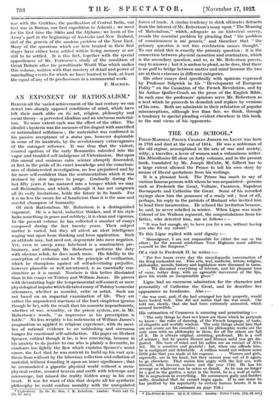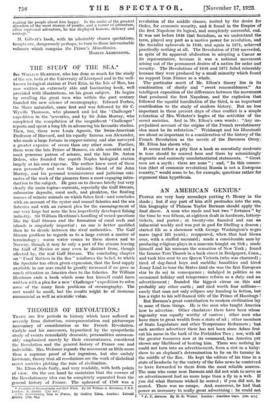THE OLD SCHOOL.
FIELD-MARSHAL PRINCE CHARLES JOSEPH DE LIGNE was born in 1785 and died at the end of 1814. He was a nobleman of the old regime, accomplished in the arts of war and society, witty, a traveller, a lover of women and a voluminous writer. His Miscellanies fill close on forty volumes, and in the present book, translated by Mr. Joseph McCabe, M. Gilbert has to a large extent allowed the Prince to tell his own story by means of liberal quotations from his writings.
It is a pleasant book. The Prince has much to say of various famous persons with whom he was acquainted—persons such as Frederick the Great, Voltaire, Casanova, Napoleon Buonaparte and Catherine the Great. Some of his recorded sayings show him the possessor of a ready wit ; best of all, perhaps, his reply to the patriots of Brabant who invited him to head their insurrection. He refused the invitation because, he said, he never rebelled in winter. When Ligne was made Colonel of his Walloon regiment, the congratulations from his father, who detested him, ran as follows :—
"It was bad enough, sir, to have you for a son, without having you also for my colonel."
To this Ligne replied with acid dignity :—
" Monseigneur, I am not responsible for either the one or the other ; for the second misfortune Your Highness must address yourself to the Emperor."
Of a visit to Frederick II. he writes :—
" For five hours every day the encyclopaedic conversation of the King enchanted me. Fine arts, war, medicine, letters, religion, philosophy, morals, history and legislation were discussed in turns. . . . We discussed everything of interest, and his pleasant tone of voice, rather deep, with an agreeable movement of the lips, gave his words an inexpressible grace."
Ligne had an enormous admiration for the character and personality of Catherine the Great, and he describes her appearance as handsome. Also :— " she was neat, and, if she had arranged her hair properly, would have looked well. One did not notice that she was small. She told me, slowly, that she had been extremely animated, which seemed incredible."
His estimation of Casanova is amusing and penetrating :—
"The only things he does net know are those which he pretends to know : the rules of dancing, of the French language, of taste, of etiquette and worldly wisdom. The only things about him that are not comic are his comedies ; and his philosophic works are the only ones with no philosophy in them, for all the others are full of it. He is always original arresting, profound. He is a well of science ; but he quotes Homer and Horace until you get dis- gusted. His turn of mind and his sallies are an extract of Attic wit. He is sensitive and grateful ; but, when one offends him, he is malignant and detestable. A million would not redeem some little joke that you made at his expense. . . . Women and girls, especially, are in his head, but they cannot pass out of it again, to go elsewhere. That makes him angry with the fair sex' with himself, with heaven, nature, and the year 1742. He luis his revenge on whatever can be eaten or drunk. As he can no longer be a god in the garden, a satyr in the forest, he is a wolf at table. He is ungracious in everything. He commences gaily and finishes sadly, desolated that he cannot begin again. If in one sense he has profited by his superiority to certain human beasts, it is in (Continued on page 758.)
• The Prince de Ligne. By 0. P. Gilbert. London : Fisher tuw-In. [I2s. ed. net.]
making the people about him happy. In the midst of the greatest disorders of the most stormy of youths, and a career of adventure, often equivocal adventure, he has displayed honour, delicacy and courage."
M. Gilbert's book, with its admirably chosen quotations, tempts one, dangerously perhaps, to turn to those interminable volumes which comprise the Prince's Miscellanies.
MARTIN ARAISTRONO.



























































 Previous page
Previous page